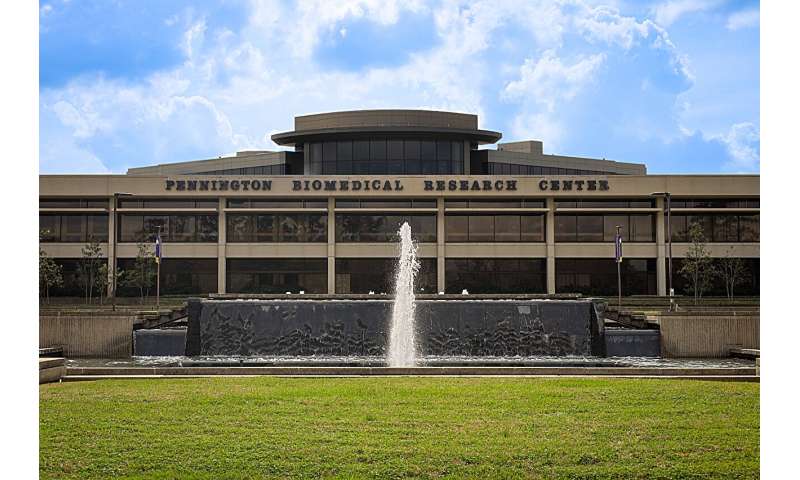A Prophetic Vision

Ahead of its time in 1983, Pennington Biomedical Research Center continues to raise the bar on scientific understanding of how nutrition impacts devastating diseases
Every day, thousands of Baton Rouge motorists zip past the iconic Pennington Biomedical Research Center on bustling Perkins Road—the expansive campus stretching 222 acres between Quail Drive and Kenilworth Parkway. The average Capital City resident no doubt knows that important research is happening inside, but few appreciate the extent of its worldwide impact.
Around the globe, Pennington Biomedical is known as a trailblazing institute whose scientists have advanced the fundamental understanding of nutrition's impact on human health. From groundbreaking research on diabetes, to pinpointing the causes of obesity, scientific breakthroughs made at Pennington Biomedical are helping to combat the thorniest health issues of our time.
But that should come as no surprise. After all, this is an institution whose very ethos is rooted in taking chances. Pennington Biomedical was born of the pioneering vision of Louisiana oil man C.B. "Doc" Pennington, who, with wife, Irene, donated $125 million to LSU in 1983 to build "the biggest and best nutrition research center in the country."
During the decades that followed, Pennington Biomedical achieved breakthrough after breakthrough, radically expanding the scientific community's understanding of the cellular relationship between nutrition and health. While the science is complex, its potential for making everyday life better for millions is plain to see.
Maximizing Performance for U.S. Military Personnel
Pennington Biomedical scientists, for example, have helped protect the health of those who defend our country. Since 1989, the center has worked with the U.S. Army to understand how nutrition on the battlefield impacts troop performance and health, identifying the caloric requirements soldiers need to perform optimally. Since then, more than 130 studies have helped the Army to shape policies that are helping to keep our armed forces healthy in conditions that push their bodies to the limit.
A New Approach to Treating Obesity
Pennington Biomedical is pioneering new approaches to the treatment of obesity. More than half of the world's population is projected to suffer from obesity by 2035—a looming public health crisis since the condition is linked to diabetes, cardiovascular disease and various cancers. Pennington Biomedical research is raising public awareness about the ways in which obesity affects bodily function at a metabolic level and developing treatment paths that attack the disease's core pathologies instead of blaming and shaming those who suffer from it.
The research center is bringing hope to those around the globe suffering from severe obesity, a condition that often leads sufferers to live isolated lives. Pennington Biomedical has partnered with Our Lady of the Lake to create the Metamor Metabolic Institute, which first opened in 2022 and is one of the first integrated, interdisciplinary centers designed to treat severe obesity. Its innovative approach combines bariatric surgery with targeted drug therapy and one-on-one counseling to facilitate lifestyle change. To date, over 1,000 have had surgery at Metamor and more than 4,000 had some form of obesity treatment, giving all those who enter the clinic a new lease on life.
Targeting Diabetes
Also on its Baton Rouge campus, Pennington Biomedical has introduced a patient-facing Diabetes Clinic to deliver innovative treatments directly to those who need them most. Using science-based methodologies, the clinic helps patients manage and treat diabetes, resulting in better health and increased longevity. In Baton Rouge and beyond, many are aware of Pennington Biomedical's groundbreaking research into the complex relationship between diet, exercise, and wellbeing. Less well-known are the hundreds of other health initiatives to which Pennington Biomedical has contributed since its founding in 1983. These initiatives are helping millions of Americans to attain a better quality of life, yesterday, today, and into the future. It's a dream realized by a visionary philanthropist and delivering worldwide impact.
Originally appeared in Country Roads magazine: https://countryroadsmagazine.com/art-and-culture/people-places/pennington-biomedical-research-center/.
About the Pennington Biomedical Research Center
The Pennington Biomedical Research Center is at the forefront of medical discovery as it relates to understanding the triggers of obesity, diabetes, cardiovascular disease, cancer and dementia. Pennington Biomedical has the vision to lead the world in promoting metabolic health and eliminating metabolic disease through scientific discoveries that create solutions from cells to society. The Center conducts basic, clinical, and population research, and is affiliated with LSU.
The research enterprise at Pennington Biomedical includes over 480 employees within a network of 40 clinics and research laboratories, and 13 highly specialized core service facilities. Its scientists and physician/scientists are supported by research trainees, lab technicians, nurses, dietitians, and other support personnel. Pennington Biomedical a state-of-the-art research facility on a 222-acre campus in Baton Rouge.
For more information, see www.pbrc.edu.
Provided by Louisiana State University